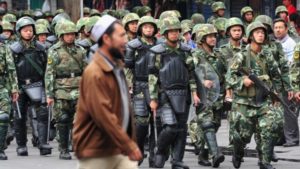by WorldTribune Staff, March 2, 2017
Religious suppression has grown “broader and deeper” under President Xi Jinping and has “created an enormous black market” for Chinese believers, according to a report by Freedom House.
Since Xi’s ascension, followers of many faiths have been pushed “to operate outside the law and to view the regime as unreasonable, unjust, or illegitimate,” the Washington-based NGO said in a report entitled “The Battle for China’s Spirit”.

According to the report, Christians have been barred from gathering for Christmas, Muslims jailed for praying outdoors and Tibetan Buddhists forced into “patriotic re-education.”
“Chinese officials have banned holiday celebrations, desecrated places of worship, and employed lethal violence,” the report said. “Security forces across the country detain, torture, or kill believers from various faiths on a daily basis.”
“Extensive surveillance, ‘re-education’ campaigns, and restrictions on private worship affect the spiritual lives of millions of people,” the report said. “And increasingly, economic reprisals and exploitation have become a source of tension and a catalyst for protests.”
The Xi administration is said to favor Buddhism and Taoism, religions the Communist Party sees as domestic belief systems that can help to instill a common sense of moral value and purpose.
In a 2016 speech on religion, Xi urged monks, imams and pastors to “interpret religious doctrines in a way that is conducive to modern China’s progress,” and called on cadres to “guide and educate the religious circle and their followers with the socialist core values.”
China has also launched a broad effort to squeeze out foreign influence and civil society in order to reassert the authority of the state, the report said.
Communist Party leadership sees “religion as a kind of existential threat to the party state. It creates a counter-ideology that can mobilize people quite quickly and quite passionately to oppose the party state,” said James Leibold, an analyst on Chinese ethnic policy at La Trobe University in Melbourne, Australia.
Religious suppression has grown on Xi’s watch, Leibold said, and “as a result, we’re seeing increasing controls across the board, from Catholicism to Tibetan Buddhism to Islam.”
In Tibetan areas, Buddhist monks face heavy restrictions on travel and religious instruction. Muslims in Xinjiang live under restrictive rules on dress, facial hair and observance of important religious occasions, such as Ramadan.
The treatment of Tibetans and Uighurs offers a glimpse of the downward spirals that can emerge under harsh policies, Leibold said.
In Xinjiang, what’s needed is de-escalation, “some kind of a peace process like the British had in Northern Ireland,” said Ian Johnson, a Pulitzer-winning journalist and author of “The Souls of China: The Return of Religion After Mao”.
Johnson said that is difficult to do when strict government policies have largely eliminated moderate voices.
“It’s a tough hole for them to climb out of there,” he said. “And this is going to be the largest conflict area for religion and state in China going forward.”
